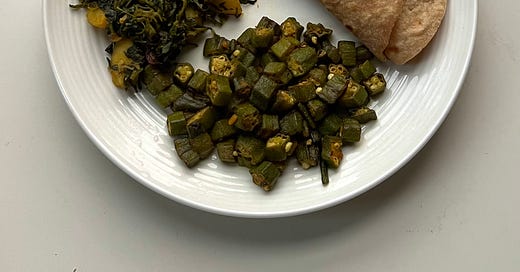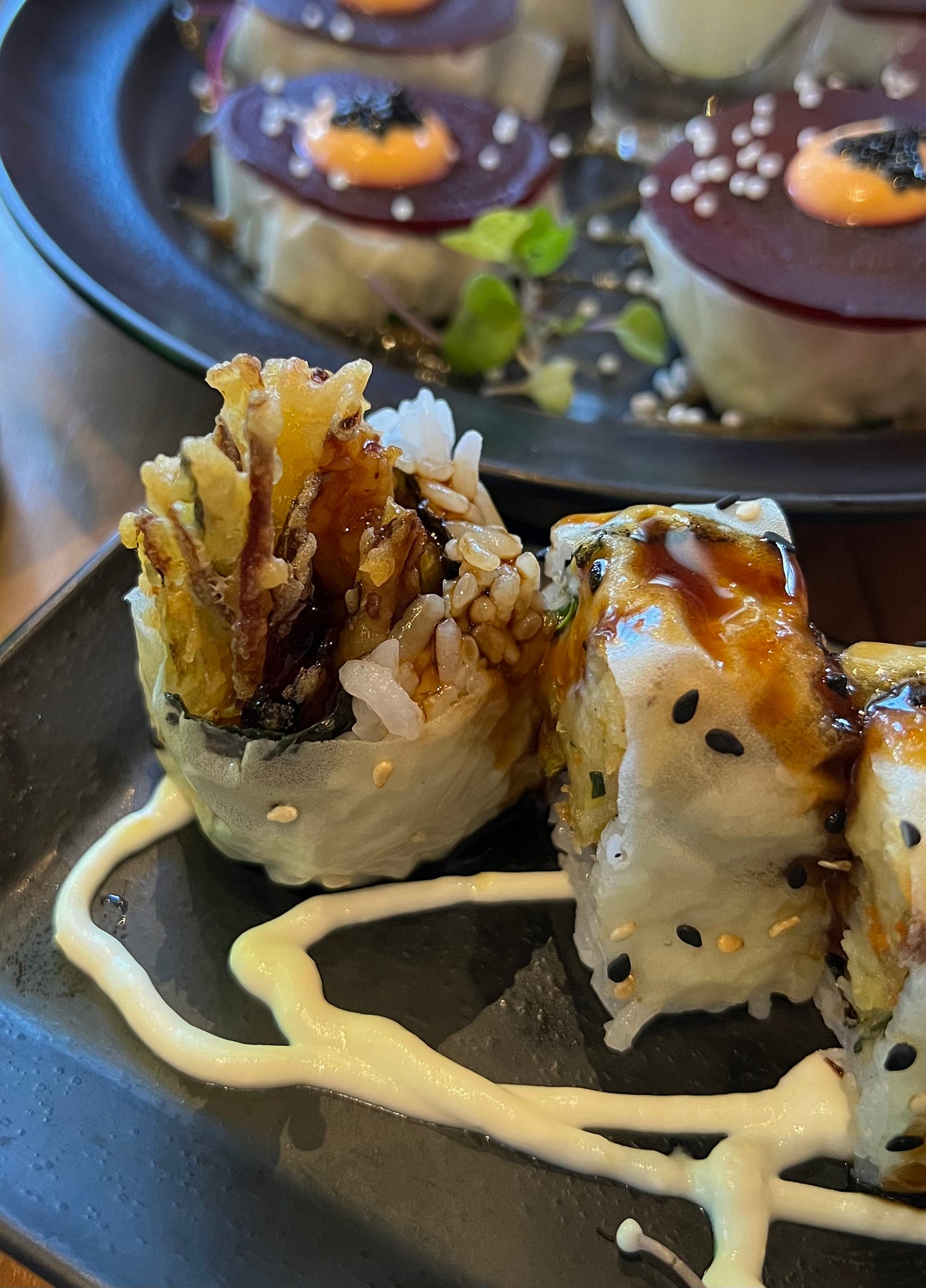In the past few months, I’ve questioned my choice to strictly adhere to veganism. When I rejected non-vegan food in certain social circumstances, I wondered what I accomplished by pushing it away. The purpose of veganism is to reduce the suffering and exploitation of living beings. In the context of the food system, collective action entails the idea that a society that eats more plant-based food will decrease demand for animal products, reduce harm induced by factory farming, and increase demand for plant-based options.
But would rejecting a bite of dahi (yogurt) vada graciously offered to me at a family gathering accomplish anything as far as demand and collective action go? I didn’t pay for the yogurt. If I try it, I can respect and compliment the labor involved in its creation. On the flip side, I guess someone else will eat one fewer bite. Nobody would admonish or be influenced by my mini rebellion. My family isn’t the type to gasp about the fact that I ate something not plant-based. In fact, they would probably be happy I tried it because what’s not to love about spongy vadas coated with thick yogurt and tangy chutneys?
There is power in deciding where we funnel our dollars to, but sometimes what we eat doesn’t serve as a representation of our values or make a statement to the people around us. This isn’t to say that we should always enjoy any food available to us regardless of its implications, but maybe we should consider the gray areas of consumption before labeling choices as unethical. In my life, these gray areas tend to present themselves in social situations: trying a bite of a cookie to appreciate someone’s efforts, eating the leftovers when nobody wants them, ordering Bi-Rite Creamery’s salted caramel for my family because it tastes like childhood (ok, I admit I could work on this one). I understand people who feel queasy about ingesting anything remotely involved with animal cruelty—sinister images from Dominion haunt me every now and then too. But I also resonate with the despair that comes with wondering what individual choices contribute to.
A common argument against veganism is that there are too many ethical factors to consider in our consumption habits. This is a cop out, but I can see where the sentiment comes from. From transportation to fashion to produce, our morality comes into play in every realm, often in ways that are impossible to measure. Recently, I was weighing the ethics of eating a cashew-based dessert over ice cream, knowing that cashew production is associated with human rights violations and unsustainable practices. But then again, most commodities are entrenched in labor issues at this point. Sometimes I buy Oreos for a party, knowing that I’m supporting packaged snacks and misleading labeling at the hands of corporations. I still let my mom buy me clothes from the mall (for the record, she has good taste), knowing that they are probably a product of fast fashion.
Thinking about how to act with the knowledge and resources we have is exhausting. Ultimately, we can only do what we have the means (and sanity) to do. Personally, eating plant-based has been the most straightforward way to reduce harm, but there are multiple ways to productively partake in a system. It isn’t a competition of who can do the most, but hyper-focusing on individual choices can make it seem like it is.
Doing something on an individual level is unarguably better than doing nothing, but when activism focuses on personal choices in isolation from the system, the system remains stagnant. Ideally, we would make the best choices we can and do our part in starting conversations with other people, voting, or if we have the time and resources to be further devoted to the cause, finding ways to spark systemic change.
I’m not trying to say that individuals are not doing enough. Part of the problem is that we shift the onus to individuals rather than holding corporations and the government accountable. Yet it is also problematic to rely on the “people in charge” to come to their senses and rescue society because that clearly hasn’t been working out. It is empowering to live in accordance with our values and contribute to collective action, but systemic change depends on interactions.
Lately, I’ve felt inspired by the power of community, both online and in person. Posting recipes on the internet can feel frivolous at times. Do we really need another easy noodle recipe? Another pretty toast? When I feel disconnected from my intentions, I have to remember that posting plant-based food from my little corner of the internet is a creative outlet and my form of activism. If even just one person tries palak tofu, that means something.
Beyond the internet, I came across a free community cooking class in San Francisco. I had spare time to volunteer as a nutrition educator and this week, our lesson covered protein. The instructor’s manual encouraged consumption of lean meats, eggs, and dairy, with a handful of plant-based proteins taking the backseat. Obviously, I ignored the manual and highlighted the diversity of plant-based proteins. During our discussion, a few people mentioned meat as their favorite protein source, but they were open to learning about plant-based proteins as well. When I elaborated on how underrated beans and lentils are, I noticed heads nodding. A few people shared their favorite ways to prepare plant-based proteins.
These moments in communal spaces give me hope. They remind me that even conversations about sauces and soups and sandwiches matter. They encourage me to try my best, even when my choices feel inconsequential.
SPICE RACK
dishing on the favorites
cooking: Nothing because I’ve spent the last couple weeks in SF! My mom kindly dropped off food and I made some thalis.
drinking: I’ve tried a few coffee shops in the city this week and my favorite was Saint Frank’s in Russian Hill. I got a basic latte but the beans alone had a unique fruity flavor.
dining: Too much going on to summarize but I made a highlight on Instagram! My favorite place had to be Shizen for vegan sushi.
reading: How the Other Half Eats by Priya Fielding-Singh. This book sort of inspired this week’s topic because Fielding-Singh draws attention to the system and culture that leads mothers to make choices for their children and families. The book highlights nutritional inequality across sociocultural backgrounds.
I also came across this piece by Grace Boey on 3 Quarks Daily; it elaborates on the individualization of responsibility and systemic change in relation to factory farming far more than I was able to.
This article on The Bittman Project discusses various changes we need in the food system. It was nice to read a food system piece that doesn’t focus on individual choices.
listening: I went to The Driver Era concert, so I mostly did my homework for that. I also listened to a lot of podcasts because my job was a tad repetitive this week.
Who Can Write About What (The Argument): In the past, I’ve had a tendency to enjoy books that are really popular but really problematic. This would have blown 16-year-old me’s mind.
Go Vegan or Eat Local (Vegan Hacks): This week I was thinking a lot about how we weigh ethical implications in our choices, but this episode did a great job of explaining why this isn’t a fair comparison.
Susan Cain on The Great Ache That Binds Us (Rich Roll): Every time I see Susan Cain’s name in a podcast episode, I don’t walk—I run. I really need to read her books.
(Not a podcast, but I watched Emma’s Copenhagen and south of France vlogs while folding laundry and they were soothing.)





